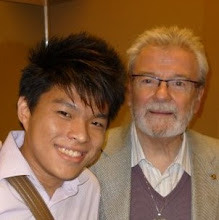The power of music is unlimited and the benefit that we can get from music is endless. Dan Elllsey, a gentleman who was born with cerebral palsy discovered that he could express himself by listening to music and composing music as well. Ellsey composed his music through a computer system called Hyperscore, invented by Tod Machover. Hyperscore was developed with the idea of how our brain responds and processes the music. Basically, our brains are very sensitive to music and they were developed to process rapid tones, which are very much similar to languages. Furthermore, our brains are wired to process music. For instance, listening to our own favorite music will trigger the thinking centre in the brain cortex, as well as the motivation and reward system in the brain. This explained that music is essential need of the human’s body, because the brain gave the same response to food, water and sex. In extension, music has medical potential as well. Doctor used music therapy to help handicapped patients to recover their talking and walking ability, and it can reduce the physical pains of a patient as well.
Music is pretty much bonded with the life of a human. We use music to celebrate events, signify something, even the great composer – Ludwig van Beethoven, wrote a symphony dedicated to Napoleon. Music has the greater influence to humans compared to languages. Music is a universal language, a language without words. We should encourage the usage of music therapy to the public and explore more new music therapy methods as well. Music is something very easy to get and most of the time you can just get it for free. Moreover, music is something very organic and harmless to a human’s body. There are no signs of side effects found from the patients after they go through music therapy. Something that is free and organic will save a lot of money for the patient. There are numbers of factory in the world were built to produce medicines. As a result of minimizing the usage of medicines, we can reduce the global warming problem by reducing the requirement of the medicine factory.
There is more positive potential that we can find in music that is waiting for us to explore. We should realize that there are plenty of solutions to cure a patient and chemical medicine isn’t the ultimate option.
Thursday, March 18, 2010
Monday, March 1, 2010
Genre of Music
Today I’m going to talk about a genre of classical music, which is concerto. Concerto is a virtuoso piece of music, which is composed for a soloist with an orchestra, and it is meant to let the soloist show off their stylistic playing. Concertos normally consist of 3 movements and they are composed in a fast-slow-fast order. Each concerto has its own unique theme and the main theme in the first movement will be elaborated in the following movements and evolves into a series of beautiful melodies.
People believe that concerto evolved from the Concerto Grosso, which appeared during the Baroque period. The main difference between the concerto and Concerto Grosso is the concerto is normally written for 1 soloist and it’s rarely written for more then 2 soloists. On the other hand, Concerto Grosso is written for a group of soloists (they called it concertino) and full orchestra. In extension, there is another theory that talks about how the concerto was invented. There is a very close relationship between a symphony with a concerto, and some people think that a concerto is evolved from a symphony. They treat a concerto as a symphony with one less movement and use Scherzo for the third movement instead of Minuet and Trio. In addition, Candenza is the distinct element that we can find in a concerto which makes it sound even more unique.
Concerto first appeared in the Baroque period. Vivaldi wrote a number of concerti for strings and winds instruments, and they are all well recognized. Concerti in the Baroque period have a lot of call and response between the soloist and the orchestra, and are mostly in monophonic rhythmic pattern. For instance, Vivaldi used scales to develop the theme of his concerto and soon modulate to an Alberti Bass or broken chords, and the orchestra repeats the same right after the soloist. Concerti written for Keyboard instruments were hardly found in the Baroque period, most likely because the keyboard instruments in that time could not produce loud dynamics except the organ.
Moving forward to the Classical period, we have the music prodigy Wolfgang Amadeus Mozart. Mozart’s concertos are all very well written in his own stylistic way of writing. He articulates the passage differently compared to the Baroque period and he loves to end his cadences with thrills. Mozart also expanded the instrumentation of the orchestra for the concerto. He added horns to the orchestra and sometimes he even took out the flute. In the Classical period, composers experimented with new musical form in the concerto. For example they used Romance, Rondo or even Theme and Variation instead of a Sonata Form.
Concerto reached its new milestone during the Romantic period when all the amazing composers explored more on the instruments. They used almost all the registers on the instrument and implied technically challenging passages. One of the greatest examples is Niccolo Paganini. He as a violin virtuoso himself exploited the technical potential of his instrument to its very limits. Meanwhile, cello concertos were mushrooming during the Romantic period as well. Composers started to realize that there were lots of things that they can explore on the cello and so, cello received the same attention as the violin from this period onwards. The cello concerto written by Antonin Dvorak is the supreme example from the Romantic period.
The developments of the concerto didn’t stop growing. During the 20th century, the concerto was no longer meant for the beauty of the melody or the musical form. The concerti needed more extended techniques to achieve some radical effects on musical language. The composers brought up a new concept of pitch, timbre and dynamics.
Concerto as a genre of music has a very important role in classical music history. Concerto helps the musician to showcase their technique and writing a concerto seems to be a must in the life of a composer. Writing or playing a concerto are both challenging and it’s a big achievement if you are able to complete it. Never the less, concerto helps to attract audience as well and it always inspires people to get to learn more about classical music.
Subscribe to:
Comments (Atom)








.jpg)








